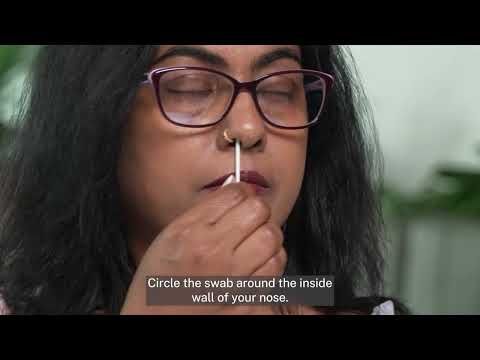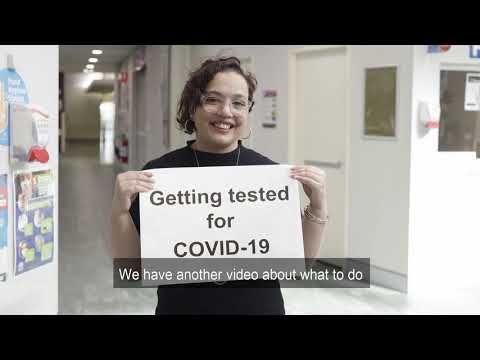About COVID-19
Image

Feeling sick and managing COVID-19 at home
Testing for COVID-19
Vaccinations
More COVID-19 resources
Rapid antigen kit resources

English - Doing a 15 minute Rapid Antigen Test (Video)
Doing a 15-minute rapid antigen test
- This video tells you about taking a test for coronavirus.
- Coronavirus is sometimes also called COVID-19.
- This video tells you about how to take a rapid antigen test.
- A rapid antigen test is sometimes also called a RAT.
- It also tells you how to read the result of your test.
This video is about doing a 15-minute rapid antigen test.
Always follow the manufacturer's instructions for the test to use. The instructions may vary slightly
You will need a rapid antigen test kit, sanitizer or somewhere to wash your hands, a timer or a watch.
Before you start blow your nose into a tissue.
Put the tissue in the bin and wash your hands.
Open the test kit.
The kit will include a test cassette, a swab, a tube with fluid inside
(In some kits the fluid comes separately and you may have to put the fluid into the tube yourself), a cap for the tube.
If the cap is on the tube remove it and keep it.
Open the test cassette and place it on a flat surface.
Stand or hold the tube with the fluid inside upright.
Take the swab out of the packet.
Do not touch the soft end.
Put the soft end on the swab about one to two centimeters into one nostril.
Circle the swab around the inside wall of your nose at least five times or for 15 seconds.
Repeat with the same swab in the other nostril.
Put the swab into the tube filled with fluid.
Stir the swab and squeeze the tube.
Do this 10 times.
Pull the swab out while squeezing the tube at the same time.
Put the cap firmly onto the tube.
Squeeze three to four drops of fluid into the small round hole on the end of the test cassette.
Read the test results after 15 minutes.
Do not wait more than 20 minutes.
If there is one coloured line next to the C in the test window the result is negative.
This indicates you do not have COVID-19.
If there are two coloured lines - one next to the C and one next to the T window - the test is positive, even if the lines are faint.
This indicates that you have COVID-19.
If there is only a coloured line next to the T or no coloured lines, the test is invalid.
This indicates that the test has not been done correctly.
Put the test equipment in the bin.
Wash your hands and clean any surfaces.

How to stop the spread of COVID-19?
How to stop the spread of COVID-19
- This video tells you about coronavirus.
- Coronavirus is sometimes also called COVID-19.
- The video tells you about how to stay healthy.
- It also tells you what to do if you are sick.
This video is about what you can do to stop the spread of COVID-19.
COVID-19, also known as coronavirus, is a virus that has made lots of people sick all around the world. A virus is an illness or disease that can spread easily from one person to another person. These are some of the things that you can do to protect yourself and others from COVID-19.
Wash your hands. You should wash your hands with soap and water for at least 20 seconds. You can also use hand sanitiser. You should do this when you come home, after you use the bathroom and before you eat. You should wash your hands after you cough or sneeze. Try to use a tissue or cough or sneeze into your elbow.
Clean the things that you touch a lot. It's also a good idea to clean things that you and other people use and touch a lot, like tables and door knobs, keys and your phone. Do this with a cloth and cleaning spray as often as you can, or ask someone else to clean it for you.
Try to stay 1.5 meters from other people. This is about two big steps away or two arms' lengths. This is called 'physical distancing'. Physical distancing can be hard for people with disability. It's ok if you can't stay 1.5 meters away from carers and family and support workers because of your disability. People who do not live with you or are providing you with care should wear a mask.
Get tested if you have symptoms. You may need to be tested for COVID-19 if you feel sick. The symptoms of COVID-19 are fever, scratchy or sore throat, cough, a runny nose, feeling short of breath, headache, loss of your sense of taste or loss of your sense of smell. If you have any of these symptoms, you should get tested for COVID-19.
We have another video about what to do if you need to get tested for COVID-19.











